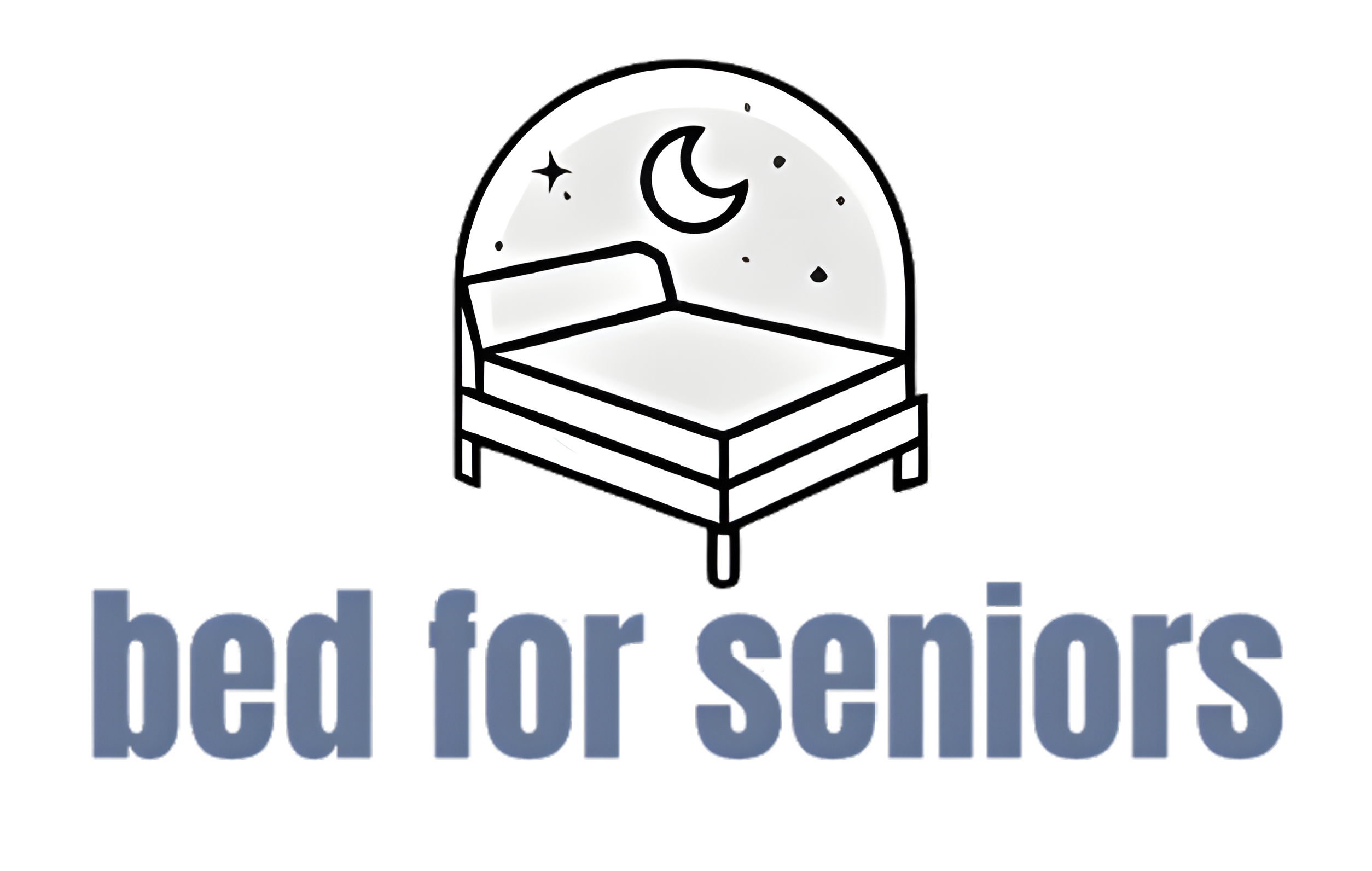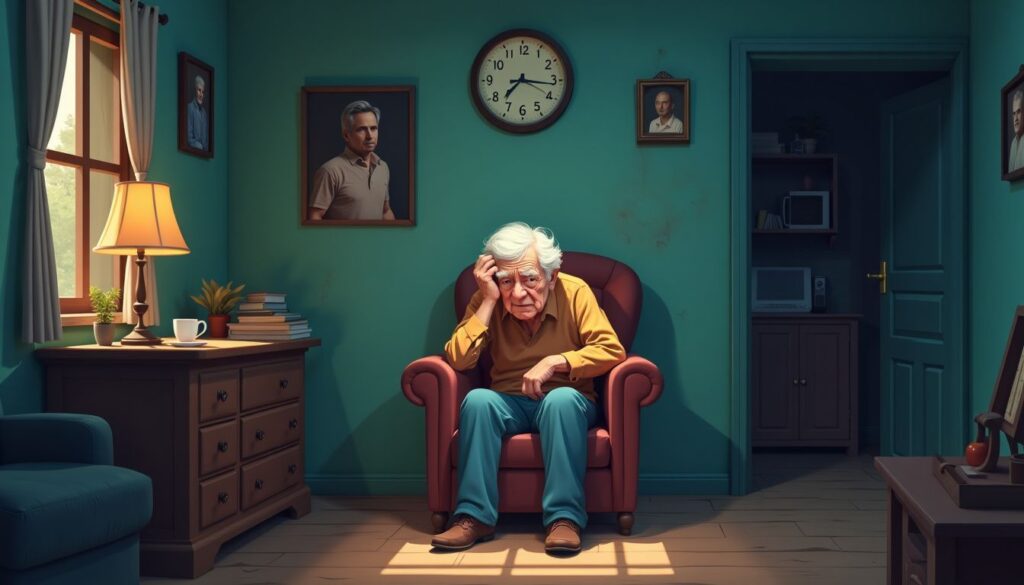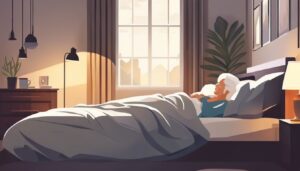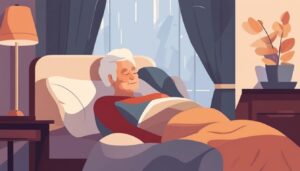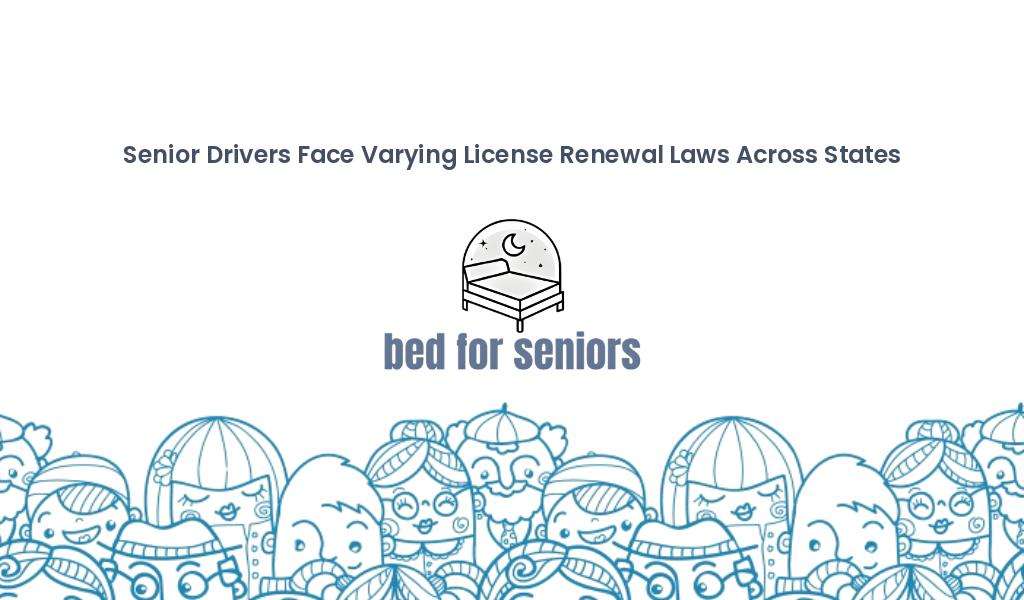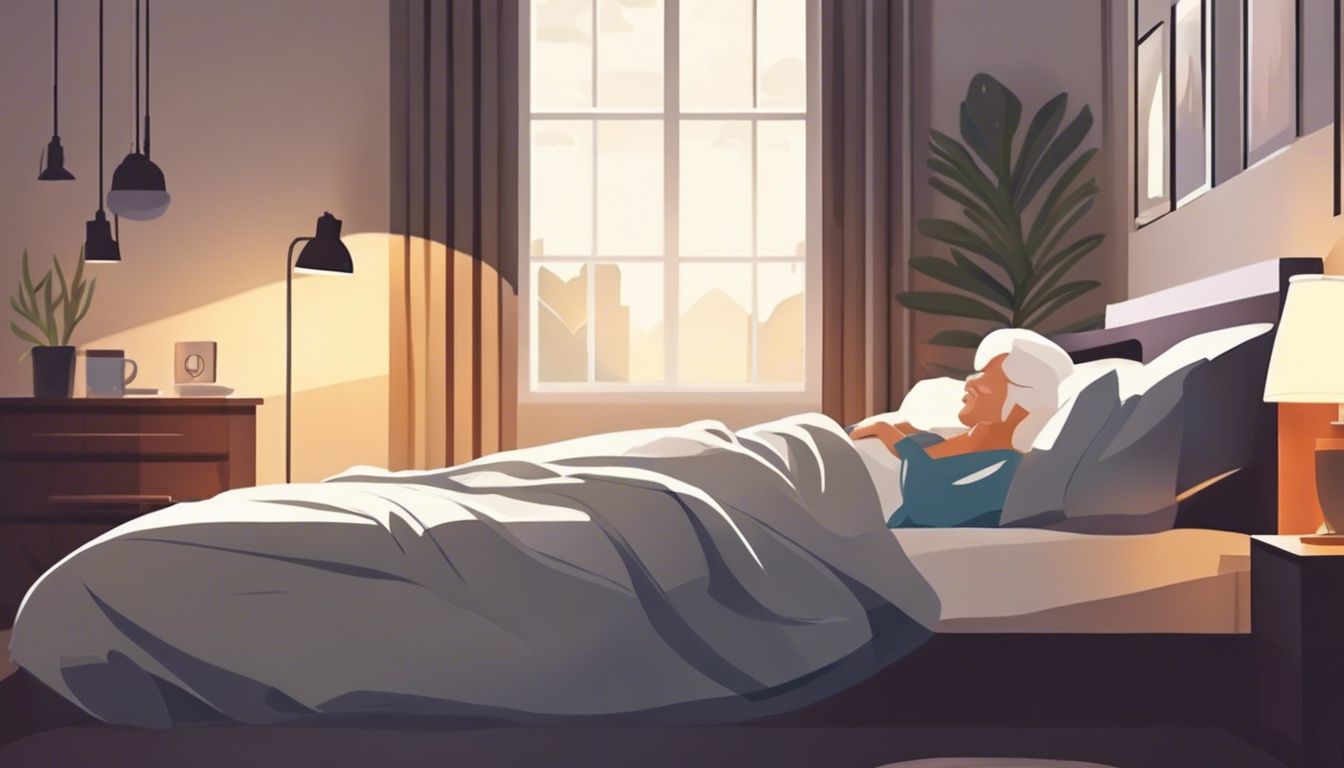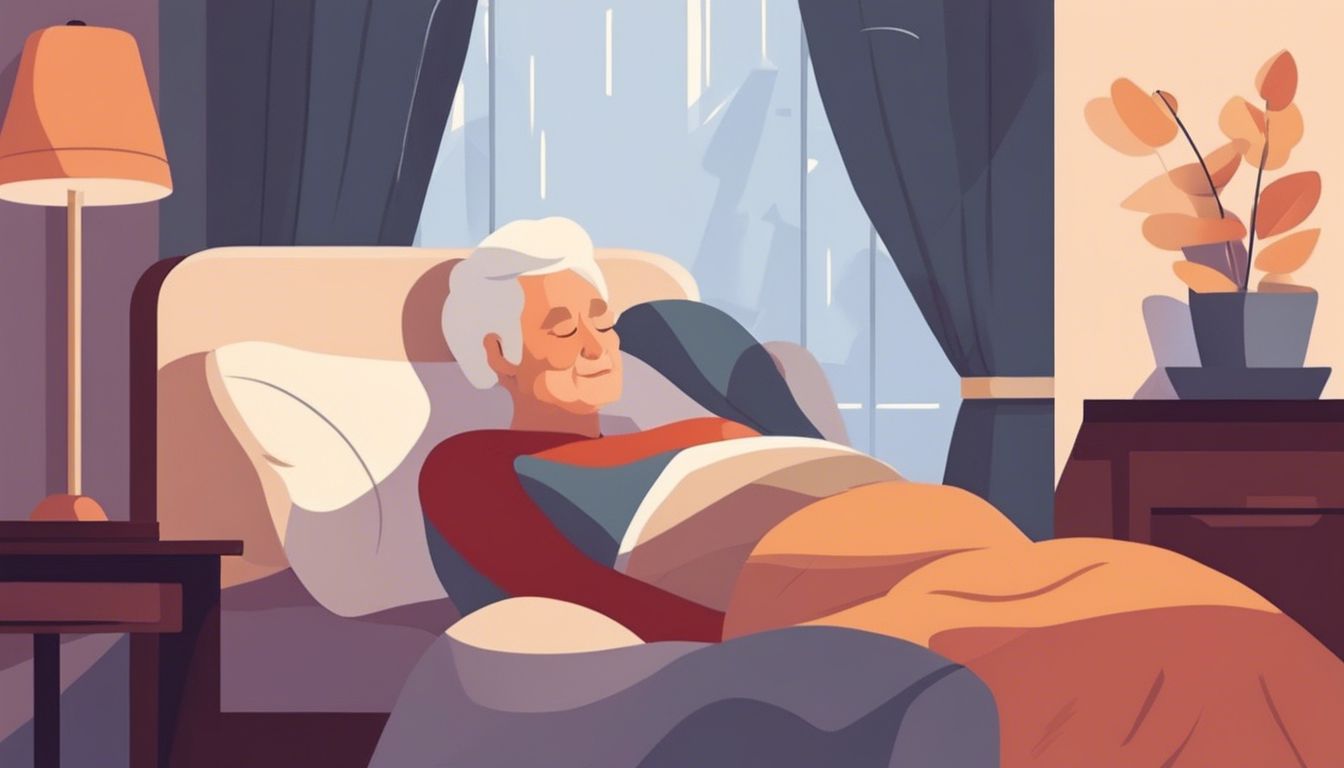Having trouble sleeping affects many older adults. About 50% of seniors struggle with insomnia. This article explains how sleep problems hurt their health and ways to improve it. Read on for insights.
Key Takeaways
- Sleep deprivation causes confusion, mood changes, and memory problems in seniors. It can lead to worse health issues like heart disease and diabetes.
- Lack of sleep increases the risk of mental health issues such as depression and anxiety for older adults. It also raises the chance of cognitive decline.
- Common sleep problems among seniors include insomnia, sleep apnea, and restless legs syndrome. These can disrupt sleep further.
- Improving the sleeping environment, medical help, lifestyle changes, and good sleep habits are ways to help seniors sleep better.
- A steady sleep schedule is important for elderly people. They should aim for 7 to 8 hours of rest each night to stay healthy.
Immediate Effects of Sleep Deprivation in Seniors
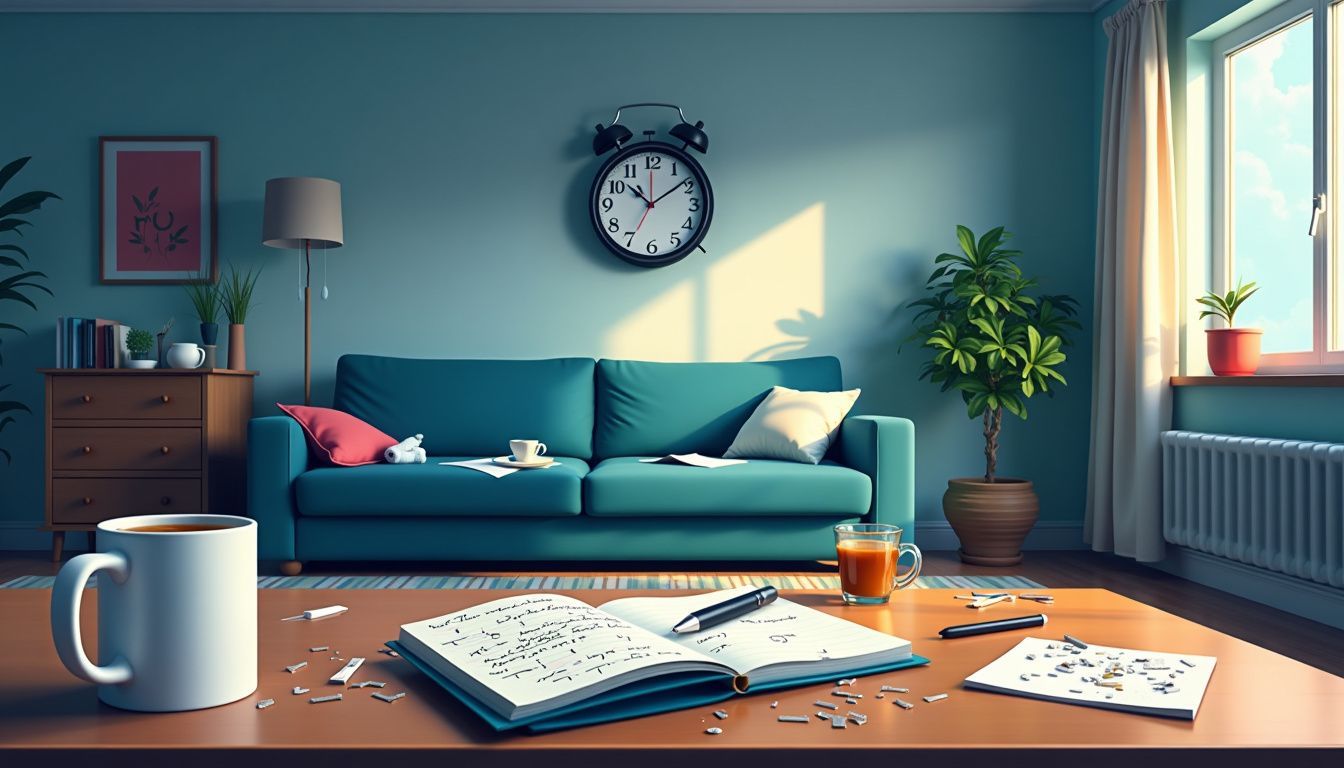
With less sleep, seniors quickly feel confused and forget things often. Their moods also swing wildly, making them feel upset or angry for little reason.
Increased Confusion and Memory Lapses
Insufficient sleep impacts the cognitive functioning of older adults. They frequently misplace objects and confuse things. This occurrence is due to the insufficient rest received by their brains, resulting in a challenging time recalling fresh data or comprehending basic tasks.
Continued sleep inadequacy amplifies memory-related issues progressively. Older adults may start to lose track of days or have difficulty remembering names. Their ability to focus also diminishes over time, complicating routine life for themselves and their caregivers.
Heightened Mood Disturbances
Lack of sleep makes seniors feel more anxious and sad. This can lead to depression over time. Sleep deprivation messes with their mood in a big way, much like it does for anyone else, but older people face bigger risks.
They might get upset easier and struggle more with feeling happy or calm. Not sleeping enough affects their mental health fast, making days harder to get through. Keeping an eye on sleep habits helps spot these mood changes early, which is key for preventing worse problems later down the line.
Long-Term Health Consequences
Not sleeping enough can hurt seniors’ hearts and make it harder for their bodies to use sugar right. Over time, this might lead to serious health issues like heart attacks or becoming a lot heavier.
Cardiovascular Issues
Sleep deprivation can cause serious heart problems in seniors. Lack of sleep leads to high blood pressure, increasing the chance of a heart attack or stroke. Studies show that not getting enough sleep raises the risk of coronary heart disease by 48% and stroke by 15%.
It’s important for elderly people to get good sleep to avoid these risks.
Next, we’ll look at how poor sleep affects the chance of diabetes and weight gain.
Risk of Diabetes and Weight Gain
Moving from heart problems, we see also that not sleeping enough can lead to getting diabetes and putting on extra pounds. Short sleep times link closely with significant weight gain and bigger risks for heart issues.
This means seniors who don’t get plenty of rest might find themselves heavier and with higher blood sugar levels. To put it simply, staying up late or waking up often at night could set the stage for needing more doctor visits for these conditions later on.
Potential for Stroke and Heart Attack
Not getting enough sleep can lead to serious heart problems in seniors. Studies show that those who don’t sleep well have a 23% higher chance of getting high blood pressure and a 15% greater risk of having a stroke.
This is because sleep helps keep the heart and blood vessels healthy. Without it, there’s more strain on them, raising the danger of heart attack and stroke.
Also, people with conditions like obstructive sleep apnea face even more risks. This disorder causes breathing to stop and start during sleep, putting extra stress on the cardiovascular system.
It’s clear that protecting seniors from these serious health issues means making sure they get good rest each night.
Sleep Deprivation and Mental Health
Insufficient sleep can result in emotional fluctuations and depression in elderly individuals. It also increases the likelihood of cognitive issues, such as clear thinking and memory-related problems.
Depression and Anxiety
Poor sleep harms seniors’ minds. It can lead to depression and anxiety, making daily life hard. Long-term lack of sleep ups the risk of depression in these folks. Their brains don’t get enough rest, meaning they feel down or worried more often.
Good sleep helps keep their mood better and minds clear.
Doctors say getting help for sleeping issues is key for older adults’ mental health. This means checking on medicines or treatments that improve sleep patterns. When seniors sleep well, they are less likely to feel sad or anxious.
Plus, their bodies stay healthier longer without the extra stress from poor sleep.
Cognitive Decline and Dementia Risk
Lack of sleep hurts seniors’ brains. It can make their minds work slower and increase dementia risk. This happens because sleeping less makes cognitive decline worse, acting like aging faster.
For example, Alzheimer’s disease connects to poor sleep.
Next, we talk about common sleep problems in seniors, such as insomnia and its effects.
Sleep Disorders Common in Seniors
Sleep trouble hits seniors hard. Insomnia, sleep apnea, and restless legs syndrome lead the charge, making nights long and rest short.
Insomnia and Its Complications
Insomnia hits up to one-third of older adults, with 15-25% struggling often. Dr. Deborah Freeland says we must find out why they can’t sleep to help them. This condition makes life hard for seniors and those who care for them.
They face trouble falling asleep or staying asleep all night.
This lack of rest leads to big problems over time. Seniors with insomnia may feel very tired during the day, get upset easily, and have a hard time thinking clearly. Their risk for serious health issues like heart disease and depression goes up too.
Taking care of insomnia early can stop these problems from getting worse.
Sleep Apnea and Cardiovascular Strain
Sleep apnea puts a big strain on the heart. In older adults, 30-60% face this issue. This condition makes obesity and heart problems more likely. The body fights to get enough air during sleep, making the heart work harder.
This extra work can lead to serious heart conditions over time. It’s key for caregivers to watch for signs of sleep apnea in seniors. Next, we’ll talk about Restless Legs Syndrome and how it disrupts sleep.
Restless Legs Syndrome and Disrupted Sleep
Restless Legs Syndrome makes seniors feel like they must move their legs. This feeling often happens at night. Because of this, they find it hard to sleep well. They might wake up many times or not get deep sleep.
This issue can lead to falls and more tiredness during the day.
This problem is a big reason why older people face insomnia. Not sleeping enough can make other health problems worse, such as heart disease or diabetes. Also, if seniors don’t sleep well, they might feel sadder or more worried than usual.
Getting good sleep is key for keeping their minds and bodies healthy.
Strategies to Improve Sleep in Seniors
Improving sleep for seniors starts with making their sleeping area quiet and comfortable, using things like special lights and softer mattresses. Medical help and sleep helpers can also make a big difference.
Changing daily habits to include more sunlight during the day and less screen time at night helps too. Finding the right time to go to bed can make falling asleep easier. For more tips, keep reading!
Establishing a Sleep-Conducive Environment
Older adults need a good sleeping space. Reducing screen time before bed helps them sleep better.
- Pick a comfortable mattress and pillows. Choose ones that support their body well.
- Keep the room cool. A temperature around 65-70 degrees Fahrenheit works best for sleep.
- Use blackout curtains to block light. This keeps the room dark, like at night.
- Limit loud noises. Soft, white noise machines can cover up unwanted sounds.
- Encourage sticking to a sleep schedule. Going to bed and waking up at the same times every day sets their internal clock right.
- Cut down on naps during the day. Too much sleep in the daytime makes it hard to sleep at night.
- Avoid big meals and caffeine before bedtime. They can keep seniors awake.
- Make sure the bedroom is only for sleep and rest, not TV or work.
- Suggest a bedtime routine, like reading or listening to soft music, to relax before sleep.
10 Stay active during the day but avoid tough exercises close to bedtime.
These steps help seniors get better rest each night, improving their overall health and mood.
Medical Interventions and Sleep Aids
Doctors often use medicines to help seniors sleep better. Melatonin, a safe option, works well for many. But some prescription sleep medicines can cause problems like confusion and falls.
Caregivers need to watch out for these side effects.
Lifestyle changes also play a big part in improving sleep. Simple habits like keeping a regular sleep-wake schedule make a big difference. For tougher cases, therapies such as cognitive behavioral therapy offer extra help without the need for more medicine.
Lifestyle Adjustments and Sleep Hygiene Practices
Getting good sleep is key for seniors. These steps help improve sleep quality.
- Set a regular sleep schedule. Wake up and go to bed at the same time every day, even on weekends.
- Avoid naps after 3 PM. Late naps can make it hard to fall asleep at night.
- Stay active during the day. Regular exercise helps, but don’t work out close to bedtime.
- Limit caffeine and alcohol before bed. They can disturb sleep cycles.
- Make the bedroom comfortable for sleep. It should be dark, quiet, and cool.
- Follow a calm bedtime routine. Reading or listening to soft music can signal your body it’s time to rest.
- Use the bed only for sleep and intimacy. This strengthens the link between bed and sleeping in your mind.
- Eat light meals in the evening. Heavy food late can keep you awake.
- Keep a worry journal outside the bedroom if stress keeps you up.
- Check medications with doctors to ensure they’re not affecting sleep.
These practices enhance stages of sleep, combat fragmented sleep, and tackle chronic conditions by promoting better rest patterns—vital for managing health in aging adults.
What is the Best Sleep Schedule for Elderly People?
For elderly people, a steady sleep schedule is key. They should aim for 7 to 8 hours of rest each night. Going to bed and waking up at the same time every day helps. This routine matches their body clocks, which may shift earlier with age.
Keeping nights reserved for sleep and days for activity also matters. Short naps can help but should not last long or happen late in the day. They could make nighttime sleep harder.
Now, let’s look at ways to solve sleep problems in seniors.
Conclusion
Sleep problems hit seniors hard. They cause confusion, mood swings, and even serious health issues like heart disease and diabetes. Not sleeping well can also lead to depression and make thinking harder for older adults.
Many face insomnia or sleep apnea, making nights tough. But there are ways to fight these sleep troubles, from fixing bedtime routines to getting medical help if needed. Good sleep is key for staying healthy at an older age.
For more detailed guidance on optimal rest, check out our article on the best sleep schedules for elderly people.
FAQs
1. What are some physical health issues linked to sleep deprivation in seniors?
Sleep deprivation can lead to several chronic diseases and medical conditions, including cardiovascular disease, Alzheimer’s disease, and mild cognitive impairment. Insufficient rest may also increase inflammation markers like C-reactive protein which signals heart trouble.
2. How does aging impact sleep patterns?
The aging process alters our circadian rhythms and sleep architecture. Seniors often experience changes in their sleep-wake cycles that result in more light sleep, less total sleep time, daytime sleepiness or even hypersomnia – excessive sleeping.
3. Can certain lifestyle choices affect the quality of a senior’s sleep?
Yes… A healthier lifestyle can improve a senior’s quality of rest by reducing instances of nighttime urination (nocturia) and minimizing fatigue from inadequate rest… Regular exercise helps regulate circadian activity while dietary habits influence overall well-being…
4. Are there specific causes for insomnia symptoms among the elderly?
Chronic pain is one major cause of insomnia symptoms among seniors… Other factors include severe insomnia due to disturbances like jet lag or changes in environment; depressive symptoms; side effects from medications such as hypnotics like zolpidem (a common sleeping pill), or even underlying chronic medical conditions…
5. Does poor quality of rest contribute to memory problems in seniors?
Absolutely! Sleep disturbances such as frequent awakenings during the night disrupt the natural pattern of “sleep architecture,” leading to feeling tired upon waking up and potential memory problems down the line…
6. How can family caregivers help manage these issues related to geriatrics’ disturbed slumber?
Caregivers play a crucial role here… They should monitor any signs of disturbed slumber using devices like actigraphy – a non-invasive method used to study human rest/activity cycles… Also, keeping an eye out for any sudden onset of severe insomnia or drastic change in behavior will be beneficial too…
